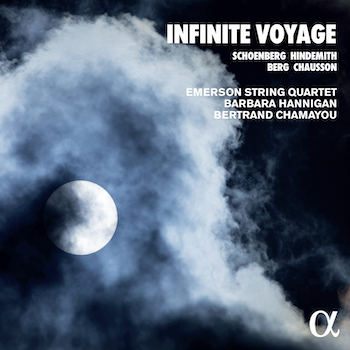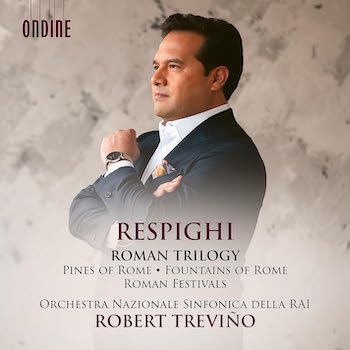Classical Album Reviews: Emerson String Quartet’s “Infinite Voyage” and Robert Trevino conducts Respighi
By Jonathan Blumhofer
The Emerson String Quartet concludes its recorded legacy pretty much the way it began it — in musical glory. Robert Trevino and the Orchestra Sinfonica Nazionale della RAI’s Respighi has plenty of spirit and heart.

The Emerson String Quartet’s final season last year read a bit like a Greatest Hits parade. Given that nobody in the last half-century matched this group in their prime playing Beethoven, Shostakovich, or Bartók, that was hardly surprising. And even if the foursome weren’t, of late, always up to their impeccable par, who would begrudge the ensemble one last time through these warhorses?
But the Emerson’s final album, Infinite Voyage, offers something entirely different: a survey of fin-de-siecle chamber music by Ernest Chausson, Alban Berg, Arnold Schoenberg, and Paul Hindemith that the group had never before committed to disc. That the recording includes the luminous contributions of a couple friends on some of the tracks – soprano Barbara Hannigan in the Hindemith, Chausson, and Schoenberg and pianist Bertrand Chamayou in the Chausson – is an added bonus.
What the disc demonstrates is that the Emersons conclude their recorded legacy pretty much the same way they began it: in musical glory – and not shying away from complexity.
To be sure, there’s nothing easy about this program, either for players or listeners. The Berg and Schoenberg, while not written according to 12-tone strictures, are both intensely chromatic and thick with thematic ideas. Yet there’s a vigor and freshness to the Emerson’s accounts of the former’s String Quartet and the latter’s Quartet No. 2 that belies the music’s complexity.
Indeed, for direction, warmth, beauty of tone, and flexible spirit, their reading of the Berg’s 1910 score is captivating. This is a performance that’s packed with an energy level that well conveys the radical exploration of sonority, texture, and counterpoint that’s at the heart of this music. For its coloristic strengths – not to mention the sense of every part falling exactly where it belongs – the Emerson’s is some exquisite, sensitive Berg.
The same goes for Schoenberg’s otherworldly 1908 effort. Here, its first two movements are firmly rooted in their day – the opening one sounds like a weirdly distended, tortured waltz; the second sounds remarkably alive despite the tautness of its materials (and also more than a little like Bartók’s subsequent contributions to the genre).
But it’s Hannigan’s magnificent delivery of the last pair – the third movement’s wild-eyed prayer and the finale’s vision of an alternate universe – that steals the show. For clarity, intensity, and expressive precision, Schoenberg doesn’t often sound more convincing.
Neither does Hindemith, whose Melancholie – settings of four poems by Christian Morgenstern that the composer penned at the end of World War 1 – exude hypnotic focus.
In the middle of this falls Chausson’s Chanson Perpétuelle, an eight-minute-long scena for voice, piano, and string quartet whose text meditates on lost love and oblivion. Far from doom and gloom, Hannigan, Chamayou, and the Emersons deliver a beautiful, precise, wonderfully blended reading that sends the esteemed ensemble out exactly as their most ardent fans might have hoped: on the top.

Robert Trevino earlier recordings for Ondine have demonstrated an affinity for Ravel and, especially, Bruch. Now, the 39-year-old conductor tries his hand at something rather different in the form of Ottorino Respighi’s Roman Trilogy. Given his history, is it any surprise the effort triumphs conspicuously?
Not really.
The triptych – Fountains of Rome (from 1916), Pines of Rome (1924), and Roman Festivals (1928) – is often recorded together. Taken as a set, these scores offer a breathtaking display of instrumental colors and invention: in one sense at least, they’re the equivalent of the greatest orchestration textbook come to life.
Trevino and the Orchestra Sinfonica Nazionale della RAI certainly embrace this aspect of the music. Their performances are lucid and energetic, the corporate effect matched by lovely individual solos. For instance, violin and flute lines in the finale of Fountains shimmer and the noodling English horn episode in “Pines of the Appian Way” is winsomely plangent.
But each reading also boasts dramatic substance and a good sense of direction. Fountains is, throughout, radiant and atmospheric. The level of dynamic nuance to be had in quiet passages, like the opening “The Fountain of Valle Giulia at Dawn,” is as alluring as the lithe textures of “The Triton Fountain in the Morning” are playful.
Pines offers frolicsome, impressively clean woodwind runs in the Villa Borghese music and rich, sepulchral low string sonorities in its evocation of the catacombs. If Trevino’s tempos in “The Pines of Janiculum” border on the spacious and “Pines of the Appian Way” threatens to push too hard early on, the first never meanders and the second settles by the time it needs to.
Similar qualities are to be found in Festivals, whose bombastic outer-movement moments rightly thrill (even the filigree runs in the finale – somehow sounding out above the thundering mass of orchestra below – sparkle). While the “Jubilee” movement dances a touch slowly, it’s beautifully balanced and builds to a radiant apotheosis. So does the third movement, whose warmly sensuous lyricism culminates in a sweetly mournful denouement.
Though Riccardo Muti’s recording of these pieces with the Philadelphia Orchestra offers, perhaps, a bit more heft and Seiji Ozawa’s with the Boston Symphony a shade more virtuosity, Trevino and his Italian band certainly belong on the same shelf. This is Respighi with spirit and heart – and vibrantly recorded, too.
Jonathan Blumhofer is a composer and violist who has been active in the greater Boston area since 2004. His music has received numerous awards and been performed by various ensembles, including the American Composers Orchestra, Kiev Philharmonic, Camerata Chicago, Xanthos Ensemble, and Juventas New Music Group. Since receiving his doctorate from Boston University in 2010, Jon has taught at Clark University, Worcester Polytechnic Institute, and online for the University of Phoenix, in addition to writing music criticism for the Worcester Telegram & Gazette.
Tagged: "infinite voyage", Alpha, Emerson String Quartet, Ondine
